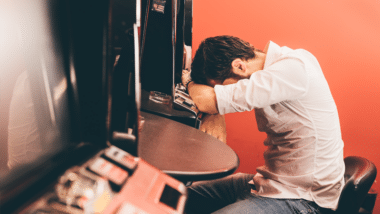A vulnerable woman who lost £1m in a month playing ‘online slots’ believes she was groomed by the gambling industry.
In 2012, lured by adverts for Jackpotjoy, Chrissy soon found herself logging on to the website to play the online slot Double Bubble.
Earlier this year, it was revealed that the number of people seeking help for problem gambling rose by over 10,000 in 2023.
Exploitation
Chrissy, reeling from a divorce and several bereavements, said that she started to gamble as a form of “escapism”. She explained: “I just couldn’t deal with the reality of life at the time.”
As her wagers increased on Jackpotjoy’s slots, the gambling website assigned several “VIP Managers” to her. Chrissy recalls: “They would phone and ask how I was getting on. I’d say: ‘Haven’t you seen my account from last night? It was pretty appalling.’ They would say: ‘Try another game!’”
Facing “horrendous” losses, she admits: “I was so isolated. I was too ashamed to tell anyone I was in this state.” Following the death of her father, Chrissy spent £1 million in a month; within two years, online slots had claimed all of her wealth.
Over a decade later, and working as a counsellor for the charity GamLearn, Chrissy reflects: “Everything about you is completely decimated. You’re left with an empty shell. That’s what I feel happened to me. I was groomed. I was victimised.”
‘Targeting’
Consultant Psychologist Dr Matt Gaskell – Clinical Lead for The NHS Northern Gambling Service – warned that betting companies are “specifically targeting their advertising to female-oriented TV programs, or choosing radio slots when women might be doing the school run”.
He also said: “If you go onto the bingo sites it’s all online slots – the most harmful and addictive forms of gambling. It’s all about cross-marketing the most addictive products.”
He added: “If you speak to people in the industry who are willing to be honest they don’t like this form of gambling. They don’t see it as gambling. They see it as a deliberate ploy by the industry to exploit people.”
Addictive by design
Agreeing with Dr Gaskell, Paddy Power founder Stewart Kenny said: “Online slot machines are highly addictive.”
He explained: “slot machines have been deliberately engineered and refined over the years to become more immersive and to take as much money from people as possible.
“They have specific characteristics and you can isolate these characteristics in a laboratory and test what is engaging people and maintaining their engagement. And the industry continues to refine them.”
According to Kenny, online slots have been found to be as addictive as cocaine and heroin.
CI campaign
In September, the Government reiterated its plans to combat the impact of “harmful gambling”.
Replying to a letter from The Christian Institute, Minister for Gambling Baroness Twycross said it remains committed to its manifesto pledge on reforming gambling legislation.
The Institute, which has been campaigning on the issue for over two decades, had advised Culture Secretary Lisa Nandy of three areas where quick effective action could be taken: gambling advertising, child protection, and online stakes.
Responding to Chrissy’s story, Gamesys, the company behind Jackpotjoy and Double Bubble, said: “While we’re unable to discuss specific account details associated with any of our players, since the time in question we have significantly enhanced our policies and processes to ensure that today we meet the highest standards of player safety and regulatory compliance.”

Women looking to escape trauma getting hooked on gambling
Mother: ‘I gambled away £5,000 in 90 minutes’
Gambling addicts helping others after thinking suicide was ‘the only way out’

